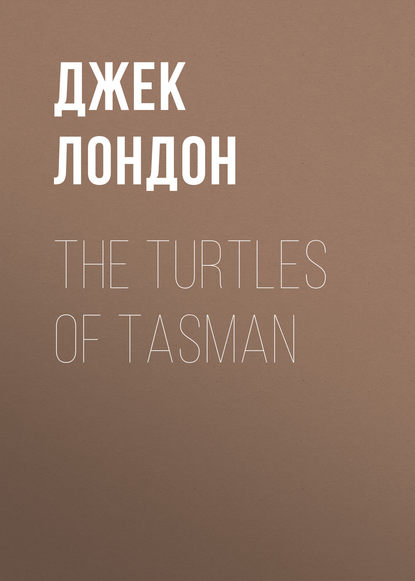По всем вопросам обращайтесь на: info@litportal.ru
(©) 2003-2025.
✖
The Turtles of Tasman
Настройки чтения
Размер шрифта
Высота строк
Поля
The answer to these questions would settle all the enigmas of the universe. I know the answer. I am not a fool. And some day, if I am plagued too desperately, I shall give the answer myself. I shall give the name of him who mislays my pen and uses up my ink. It is so silly to think that I could use such a quantity of ink. The servant lies. I know.
I have got me a fountain pen. I have always disliked the device, but my old stub had to go. I burned it in the fireplace. The ink I keep under lock and key. I shall see if I cannot put a stop to these lies that are being written about me. And I have other plans. It is not true that I have recanted. I still believe that I live in a mechanical universe. It has not been proved otherwise to me, for all that I have peered over his shoulder and read his malicious statement to the contrary. He gives me credit for no less than average stupidity. He thinks I think he is real. How silly. I know he is a brain-figment, nothing more.
There are such things as hallucinations. Even as I looked over his shoulder and read, I knew that this was such a thing. If I were only well it would be interesting. All my life I have wanted to experience such phenomena. And now it has come to me. I shall make the most of it. What is imagination? It can make something where there is nothing. How can anything be something where there is nothing? How can anything be something and nothing at the same time? I leave it for the metaphysicians to ponder. I know better. No scholastics for me. This is a real world, and everything in it is real. What is not real, is not. Therefore he is not. Yet he tries to fool me into believing that he is … when all the time I know he has no existence outside of my own brain cells.
I saw him to-day, seated at the desk, writing. It gave me quite a shock, because I had thought he was quite dispelled. Nevertheless, on looking steadily, I found that he was not there – the old familiar trick of the brain. I have dwelt too long on what has happened. I am becoming morbid, and my old indigestion is hinting and muttering. I shall take exercise. Each day I shall walk for two hours.
It is impossible. I cannot exercise. Each time I return from my walk, he is sitting in my chair at the desk. It grows more difficult to drive him away. It is my chair. Upon this I insist. It was his, but he is dead and it is no longer his. How one can be befooled by the phantoms of his own imagining! There is nothing real in this apparition. I know it. I am firmly grounded with my fifty years of study. The dead are dead.
And yet, explain one thing. To-day, before going for my walk, I carefully put the fountain pen in my pocket before leaving the room. I remember it distinctly. I looked at the clock at the time. It was twenty minutes past ten. Yet on my return there was the pen lying on the desk. Some one had been using it. There was very little ink left. I wish he would not write so much. It is disconcerting.
There was one thing upon which Jim and I were not quite agreed. He believed in the eternity of the forms of things. Therefore, entered in immediately the consequent belief in immortality, and all the other notions of the metaphysical philosophers. I had little patience with him in this. Painstakingly I have traced to him the evolution of his belief in the eternity of forms, showing him how it has arisen out of his early infatuation with logic and mathematics. Of course, from that warped, squinting, abstract view-point, it is very easy to believe in the eternity of forms.
I laughed at the unseen world. Only the real was real, I contended, and what one did not perceive, was not, could not be. I believed in a mechanical universe. Chemistry and physics explained everything. "Can no being be?" he demanded in reply. I said that his question was but the major promise of a fallacious Christian Science syllogism. Oh, believe me, I know my logic, too. But he was very stubborn. I never had any patience with philosophic idealists.
Once, I made to him my confession of faith. It was simple, brief, unanswerable. Even as I write it now I know that it is unanswerable. Here it is. I told him: "I assert, with Hobbes, that it is impossible to separate thought from matter that thinks. I assert, with Bacon, that all human understanding arises from the world of sensations. I assert, with Locke, that all human ideas are due to the functions of the senses. I assert, with Kant, the mechanical origin of the universe, and that creation is a natural and historical process. I assert, with Laplace, that there is no need of the hypothesis of a creator. And, finally, I assert, because of all the foregoing, that form is ephemeral. Form passes. Therefore we pass."
I repeat, it was unanswerable. Yet did he answer with Paley's notorious fallacy of the watch. Also, he talked about radium, and all but asserted that the very existence of matter had been exploded by these later-day laboratory researches. It was childish. I had not dreamed he could be so immature.
How could one argue with such a man? I then asserted the reasonableness of all that is. To this he agreed, reserving, however, one exception. He looked at me, as he said it, in a way I could not mistake. The inference was obvious. That he should be guilty of so cheap a quip in the midst of a serious discussion, astounded me.
The eternity of forms. It is ridiculous. Yet is there a strange magic in the words. If it be true, then has he not ceased to exist. Then does he exist. This is impossible.
I have ceased exercising. As long as I remain in the room, the hallucination does not bother me. But when I return to the room after an absence, he is always there, sitting at the desk, writing. Yet I dare not confide in a physician. I must fight this out by myself.
He grows more importunate. To-day, consulting a book on the shelf, I turned and found him again in the chair. This is the first time he has dared do this in my presence. Nevertheless, by looking at him steadily and sternly for several minutes, I compelled him to vanish. This proves my contention. He does not exist. If he were an eternal form I could not make him vanish by a mere effort of my will.
This is getting damnable. To-day I gazed at him for an entire hour before I could make him leave. Yet it is so simple. What I see is a memory picture. For twenty years I was accustomed to seeing him there at the desk. The present phenomenon is merely a recrudescence of that memory picture – a picture which was impressed countless times on my consciousness.
I gave up to-day. He exhausted me, and still he would not go. I sat and watched him hour after hour. He takes no notice of me, but continually writes. I know what he writes, for I read it over his shoulder. It is not true. He is taking an unfair advantage.
Query: He is a product of my consciousness; is it possible, then, that entities may be created by consciousness?
We did not quarrel. To this day I do not know how it happened. Let me tell you. Then you will see. We sat up late that never-to-be-forgotten last night of his existence. It was the old, old discussion – the eternity of forms. How many hours and how many nights we had consumed over it!
On this night he had been particularly irritating, and all my nerves were screaming. He had been maintaining that the human soul was itself a form, an eternal form, and that the light within his brain would go on forever and always. I took up the poker.
"Suppose," I said, "I should strike you dead with this?"
"I would go on," he answered.
"As a conscious entity?" I demanded.
"Yes, as a conscious entity," was his reply. "I should go on, from plane to plane of higher existence, remembering my earth-life, you, this very argument – ay, and continuing the argument with you."
It was only argument[1 - (Forcible – ha! ha! – comment of Rudolph Heckler on margin.)]. I swear it was only argument. I never lifted a hand. How could I? He was my brother, my elder brother, Jim.
I cannot remember. I was very exasperated. He had always been so obstinate in this metaphysical belief of his. The next I knew, he was lying on the hearth. Blood was running. It was terrible. He did not speak. He did not move. He must have fallen in a fit and struck his head. I noticed there was blood on the poker. In falling he must have struck upon it with his head. And yet I fail to see how this can be, for I held it in my hand all the time. I was still holding it in my hand as I looked at it.
It is an hallucination. That is a conclusion of common sense. I have watched the growth of it. At first it was only in the dimmest light that I could see him sitting in the chair. But as the time passed, and the hallucination, by repetition, strengthened, he was able to appear in the chair under the strongest lights. That is the explanation. It is quite satisfactory.
I shall never forget the first time I saw it. I had dined alone downstairs. I never drink wine, so that what happened was eminently normal. It was in the summer twilight that I returned to the study. I glanced at the desk. There he was, sitting. So natural was it, that before I knew I cried out "Jim!" Then I remembered all that had happened. Of course it was an hallucination. I knew that. I took the poker and went over to it. He did not move nor vanish. The poker cleaved through the non-existent substance of the thing and struck the back of the chair. Fabric of fancy, that is all it was. The mark is there on the chair now where the poker struck. I pause from my writing and turn and look at it – press the tips of my fingers into the indentation.
He did continue the argument. I stole up to-day and looked over his shoulder. He was writing the history of our discussion. It was the same old nonsense about the eternity of forms. But as I continued to read, he wrote down the practical test I had made with the poker. Now this is unfair and untrue. I made no test. In falling he struck his head on the poker.
Some day, somebody will find and read what he writes. This will be terrible. I am suspicious of the servant, who is always peeping and peering, trying to see what I write. I must do something. Every servant I have had is curious about what I write.
Fabric of fancy. That is all it is. There is no Jim who sits in the chair. I know that. Last night, when the house was asleep, I went down into the cellar and looked carefully at the soil around the chimney. It was untampered with. The dead do not rise up.
Yesterday morning, when I entered the study, there he was in the chair. When I had dispelled him, I sat in the chair myself all day. I had my meals brought to me. And thus I escaped the sight of him for many hours, for he appears only in the chair. I was weary, but I sat late, until eleven o'clock. Yet, when I stood up to go to bed, I looked around, and there he was. He had slipped into the chair on the instant. Being only fabric of fancy, all day he had resided in my brain. The moment it was unoccupied, he took up his residence in the chair. Are these his boasted higher planes of existence – his brother's brain and a chair? After all, was he not right? Has his eternal form become so attenuated as to be an hallucination? Are hallucinations real entities? Why not? There is food for thought here. Some day I shall come to a conclusion upon it.
He was very much disturbed to-day. He could not write, for I had made the servant carry the pen out of the room in his pocket But neither could I write.
The servant never sees him. This is strange. Have I developed a keener sight for the unseen? Or rather does it not prove the phantom to be what it is – a product of my own morbid consciousness?
He has stolen my pen again. Hallucinations cannot steal pens. This is unanswerable. And yet I cannot keep the pen always out of the room. I want to write myself.
I have had three different servants since my trouble came upon me, and not one has seen him. Is the verdict of their senses right? And is that of mine wrong? Nevertheless, the ink goes too rapidly. I fill my pen more often than is necessary. And furthermore, only to-day I found my pen out of order. I did not break it.
I have spoken to him many times, but he never answers. I sat and watched him all morning. Frequently he looked at me, and it was patent that he knew me.
By striking the side of my head violently with the heel of my hand, I can shake the vision of him out of my eyes. Then I can get into the chair; but I have learned that I must move very quickly in order to accomplish this. Often he fools me and is back again before I can sit down.
It is getting unbearable. He is a jack-in-the-box the way he pops into the chair. He does not assume form slowly. He pops. That is the only way to describe it. I cannot stand looking at him much more. That way lies madness, for it compels me almost to believe in the reality of what I know is not. Besides, hallucinations do not pop.
Thank God he only manifests himself in the chair. As long as I occupy the chair I am quit of him.
My device for dislodging him from the chair by striking my head, is failing. I have to hit much more violently, and I do not succeed perhaps more than once in a dozen trials. My head is quite sore where I have so repeatedly struck it. I must use the other hand.
My brother was right. There is an unseen world. Do I not see it? Am I not cursed with the seeing of it all the time? Call it a thought, an idea, anything you will, still it is there. It is unescapable. Thoughts are entities. We create with every act of thinking. I have created this phantom that sits in my chair and uses my ink. Because I have created him is no reason that he is any the less real. He is an idea; he is an entity: ergo, ideas are entities, and an entity is a reality.
Query: If a man, with the whole historical process behind him, can create an entity, a real thing, then is not the hypothesis of a Creator made substantial? If the stuff of life can create, then it is fair to assume that there can be a He who created the stuff of life. It is merely a difference of degree. I have not yet made a mountain nor a solar system, but I have made a something that sits in my chair. This being so, may I not some day be able to make a mountain or a solar system?
All his days, down to to-day, man has lived in a maze. He has never seen the light. I am convinced that I am beginning to see the light – not as my brother saw it, by stumbling upon it accidentally, but deliberately and rationally. My brother is dead. He has ceased. There is no doubt about it, for I have made another journey down into the cellar to see. The ground was untouched. I broke it myself to make sure, and I saw what made me sure. My brother has ceased, yet have I recreated him. This is not my old brother, yet it is something as nearly resembling him as I could fashion it. I am unlike other men. I am a god. I have created.
Whenever I leave the room to go to bed, I look back, and there is my brother sitting in the chair. And then I cannot sleep because of thinking of him sitting through all the long night-hours. And in the morning, when I open the study door, there he is, and I know he has sat there the night long.
I am becoming desperate from lack of sleep. I wish I could confide in a physician.
Blessed sleep! I have won to it at last. Let me tell you. Last night I was so worn that I found myself dozing in my chair. I rang for the servant and ordered him to bring blankets. I slept. All night was he banished from my thoughts as he was banished from my chair. I shall remain in it all day. It is a wonderful relief.
It is uncomfortable to sleep in a chair. But it is more uncomfortable to lie in bed, hour after hour, and not sleep, and to know that he is sitting there in the cold darkness.
It is no use. I shall never be able to sleep in a bed again. I have tried it now, numerous times, and every such night is a horror. If I could but only persuade him to go to bed! But no. He sits there, and sits there – I know he does – while I stare and stare up into the blackness and think and think, continually think, of him sitting there. I wish I had never heard of the eternity of forms.
The servants think I am crazy. That is but to be expected, and it is why I have never called in a physician.
I am resolved. Henceforth this hallucination ceases. From now on I shall remain in the chair. I shall never leave it. I shall remain in it night and day and always.

















